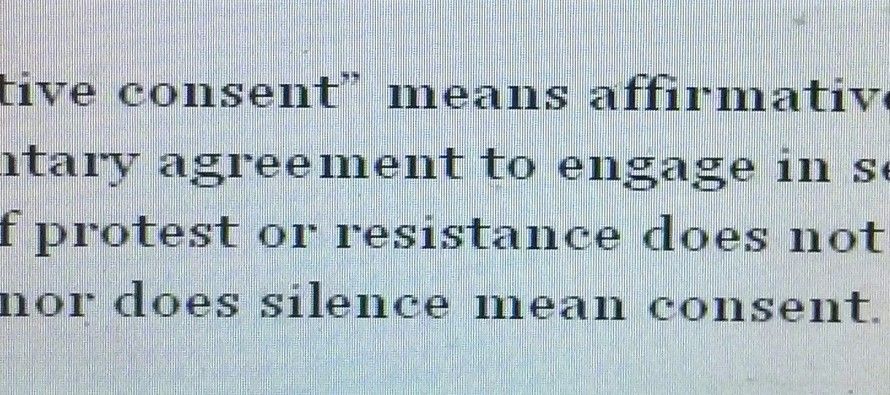Noted liberal pundit: CA ‘affirmative consent’ law a ‘radical experiment’

The problem of sexual violence and abuse on college campuses is a huge one. But California’s new “affirmative consent law,” which requires college students having sex to obtain “affirmative, conscious, and voluntary agreement … throughout a sexual activity,” is certain to be hugely problematic. It sets up a standard of guilt for sex crimes for 3 million college students that is vastly broader than the one for other Californians.
Thoughtful liberals starting with New York magazine’s Jonathan Chait are among those who wonder how this could possibly work out well. He also thinks it could haunt the CA Democrats who passed the law. This is from Chait’s latest column, headlined “California’s Radical College-Sex-Law Experiment”:
The law’s defenders have made some interesting counterarguments. But these, in turn, merely underscore the vast distance between the law’s aspiration and its realistic prospects. “Confirming consent leads to much hotter sex,” writes my colleague Ann Friedman, who suggests various ways that continuous affirmation could be given without killing the mood, “We’re still deprogramming the idea that nice girls don’t admit they like sex, let alone talk about how they like it.” …
It surely is possible to imagine that sex that comports with these new guidelines is sexy, or even more sexy than the kind most people have now. Yet one might find these ideas about reimagining sex attractive, as I do, while still having deep reservations about codifying them into law.
Hollywood sex scenes fit definition of CA college rape
Chait finds a smart way to frame how sweeping this law is.
The fact that we need to change cultural attitudes about sex itself underscores the fact that cultural attitudes about sex lie well outside the contours established by the state of California. What percentage of the last decade worth of Hollywood sex scenes, if acted out between college students in California, would technically constitute rape? A majority? Ninety percent?
Deprogramming and reorienting societal ideas about sex is an evolutionary process. California isn’t merely attempting to set out to nudge the culture in this direction. It is reclassifying all sex that falls outside those still-novel ideas as rape. A law premised on this sort of sweeping, wholesale change is likely to fail.
And what might that mean politically?
[P]eople have certain intuitive beliefs about justice. If most college students today do not think that sex without continuous, affirmative consent is actually rape, and there is a law in place rendering it as such, soon enough, somebody is going to be prosecuted under these terms. And that person will become a victim of a standard of justice that offends the moral sensibilities of a large number of Americans, which is directly attributable to the actions of California’s elected Democratic officials. What will the law’s defenders do then?
‘Your guess is as good as mine’
This day is coming. It’s inevitable, given that authorities are being told to enforce a vague, amazingly broad law.
This passage from Cathy Young’s recent essay in TIME is chilling:
In addition to creating a vaguely and subjectively defined offense of nonconsensual sex, the bill also explicitly places the burden of proof on the accused, who must demonstrate that he (or she) took “reasonable steps … to ascertain whether the complainant affirmatively consented.” When the San Gabriel Valley Tribune asked [bill sponsor Bonnie] Lowenthal how an innocent person could prove consent under such a standard, her reply was, “Your guess is as good as mine.”
Your guess is as as good as mine. Wow.
Chait is right. This is an experiment. I wonder how many people will have their lives destroyed before it is called off.
Related Articles
Inside state government ineptitude
March 6, 2013 By Katy Grimes The State of California has a serious backlog of new business filings, so says
Illegal employees are legal ambiguity
Katy Grimes: As a former employer, I hired illegal immigrants – not deliberately, or knowingly, but because fraudulent identification was
Leader of state #MeToo movement accused of sexual harassment
The sexual harassment scandals hanging over the state Capitol in Sacramento took a dramatic turn Thursday when the most prominent




